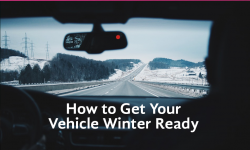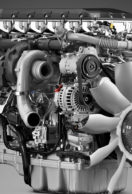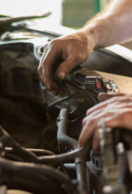Brakes wear out and need replacing. But how do you know when that time comes? You definitely don’t want to find out the hard way—by stepping on the brake and having nothing happen. Your car has ways of telling you that you need new brakes long before they stop working altogether.
But first, let’s talk about the parts on your brakes that wear out and need replacing.
Modern brakes work by a caliper with a brake pad pressing against a metal disc, called a rotor, attached to the wheel when you press down on the brake pedal. The caliper contains a hydraulic piston that pushes the pad onto the rotor.
The brake pads are made of a material that is durable but wears down over time. To keep your brakes in good shape, these pads need to be replaced before they wear out. If left too long, the worn pads will damage the rotor, and you will need to replace that as well.
Here’s how to tell when it’s time for new brakes.
Squealing Noises
A squealing or other loud noise when you press on the brakes is a sure sign that you need new brake pads. That unpleasant squeal is a safety mechanism built into the brakes. Once the pads wear beyond a certain point, the exposed metal comes into contact with the rotor and makes that noise. This metal’s purpose is to warn you that your brakes need attention.
If you ignore the squeal until it goes away, you might hear a new sound. It will likely be a grinding noise. When the brake pad wears down to a dangerously low level, the metal that the brake pad is attached to starts to rub directly against the rotor. This will wear out your rotor, increasing your repair cost. It’s also dangerous. If your brakes make a loud grinding noise, get them looked at right away.
Clicking Noises
Brake pads are designed to be replaced. Part of that design includes making them relatively easy for a mechanic to remove. For this reason, they’re typically held in place by clips or pins. The brake pad is further secured by sitting in a cavity within the caliper. If the clips are damaged for any reason, the pads can become loose, and you’ll hear a click-type noise as they move around within their housing when you press the brakes.
Again, this is not good, and you should get the brakes looked at as soon as possible.
Delayed Stop
Brake fade is what happens when you hold the brakes down for a long time without actually coming to a stop. Sometimes it’s necessary, such as when descending a steep mountain, but the practice of riding your brakes should be avoided unless absolutely necessary. Keeping the brakes pressed over distances longer than what you would need to come to a stop causes increased wear on all parts of the brakes, leading to what is known as brake fade.
Brake fade happens because calipers and rotors heat up during use. Riding the brakes causes excessive heating, which leads to the brakes being unable to do their job properly. The result is that you find yourself not stopping as quickly as you once could.
Not sure about your brakes? Get in touch today to schedule an appointment.








